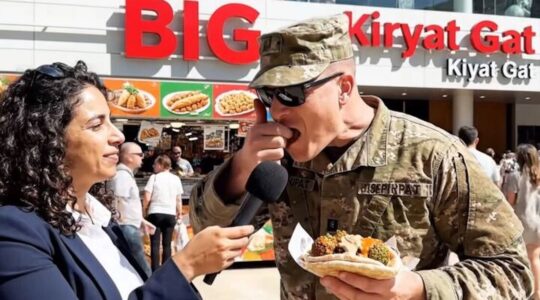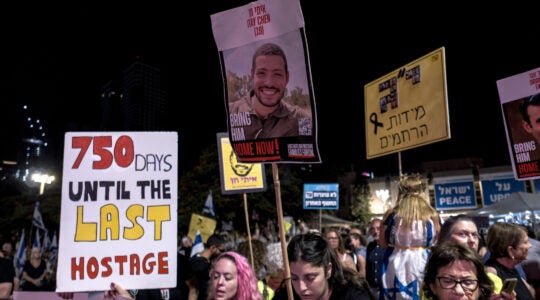ASHKELON, Israel (JTA) – Eighteen-year-old Eden Sharbane awoke before dawn Saturday to the eerie sound of a “red alert” siren in her Ashkelon neighborhood. Glancing outside her window, she saw a red-and-orange blur: A rocket was about to hit her apartment building.
Sharbane screamed and called out in warning to her mother.
Two floors above them, a rocket fired by Palestinian terrorists in the Gaza Strip, some 10 miles away, crashed through the concrete and steel rods of the building’s roof and landed in a neighbor’s living room.
Practically overnight, life in this quiet coastal city has changed dramatically. Thirteen rockets landed in Ashkelon over the course of four days, and with the IDF having launched a ground invasion into Gaza over the weekend, shaken residents here suddenly find themselves in a war zone.
“All of a sudden I began to realize what a different reality there is now,” Sharbane said.
After the attack on her building, Sharbane went out for seaside walk to try to calm her frayed nerves, but another rocket fell in a nearby parking lot.
Less than a day later, the hole in the ground marking the spot of its landing had been paved over with fresh asphalt, but residents of this city of 120,000 know that despite quick clean-ups and reassurances, they are Israel’s new front line in the battle against Palestinian rocket crews in Gaza.
Israel’s internal security minister, Avi Dichter, who is himself a resident of Ashkelon, said Sunday that since last week the number of Israelis living under the threat of Palestinian rocket fire has jumped to 250,000 from 25,000.
After the first Katyusha-style rockets landed in Ashkelon late last week, the city activated the city’s Red Alert rocket-warning system, which gives residents about 15 seconds to find cover. The system has been active for several years in towns closer to Gaza, including Sderot.
Chaim Ashtamker, a 36-year-old bus driver in Ashkelon, said he fears Ashkelon will share the same fate as Sderot, which has become a ghost of its former self after seven incessant years of rocket fire. With Palestinian terrorists in Gaza using new, longer-range Katyusha-type rockets, the coastal city of Ashkelon has become their key target.
“Our routines go on as normal, but we are all a little in shock,” Ashtamker said. “I have small children at home, so of course I am scared.”
There were few people along the streets and beaches of Ashkelon on Sunday. Many children asked to stay home from school and parents tried to calm them even as they admitted to feeling bewildered themselves by their newfound circumstances.
Residents debated whether or not the new ground incursion into Gaza – which killed scores of Palestinians, including many civilians, and left two Israeli soldiers dead – was the right answer.
Liya Gil, a 32-year-old Ashkelon resident and a recent contestant on the Israeli version of the reality TV show “Survivor,” paused after a seaside interview with a local entertainment show to ponder the city’s new circumstances.
“I came out of the reality show ‘Survivor’ to the real Survivor,” she said with a laugh. Then, turning serious, she said, “There is the army and defense ministry to take care of things. I hope things will improve.”
Shimon Avital, 58, owner of a small mini-market, predicted a long, difficult fight.
“The government understood it was time to take action,” he said, but “the battle will be a hard one.”
He suggested Israel create a new security zone along the Gaza-Israel border to help stop the rockets.
Writing in Israel’s daily Yediot Acharonot, columnist Nahum Barnea said Israel faces a dilemma, forced to choose between “the plague and cholera.”
“Ultimately, the debate boils down to two possibilities: Either the IDF seizes renewed control over the Gaza Strip or extensive parts of it, or Israel begins open, direct and serious negotiations with Hamas,” he wrote. “The choice between those two options is a choice between the plague and cholera. Nevertheless, it appears to be unavoidable.”
As the army fought on in Gaza and Palestinian terrorists continued to fire rockets at Israel, Alan Marcus, head of strategic planning for Ashkelon, sat in his office surrounded by maps of the city. He described how officials were coping with the crisis – from fixing up bomb shelters to posting instructions in Hebrew, Russian and Amharic explaining how residents should protect themselves.
He showed some digital maps he had designed that show where some of the weakest populations in the city live – among them the elderly, handicapped and recent immigrants – so teams can be dispatched quickly to help them in the event of an attack.
At an underground emergency control center, he showed how city officials were staffing different desks: public information, logistics, engineering and education.
Marcus, who has lived in the city since immigrating here in 1975 from Boston, compared the current situation to what happened to northern Israeli cities along the border with Lebanon during the 2006 war with Hezbollah in Lebanon.
“I hope sanity will return,” he said, expressing hope that the cross-border attacks soon will subside. He said he has been fielding calls from concerned Jews in Baltimore, which is a “sister city” of Ashkelon.
At a café at the city’s train station, there were few commuters at rush hour on Sunday, the start of Israel’s work week. Einat Azriki, 24, who works at a café inside the station, said she’s still digesting the change of events.
“We are now learning what real fear feels like,” she said.
JTA has documented Jewish history in real-time for over a century. Keep our journalism strong by joining us in supporting independent, award-winning reporting.





